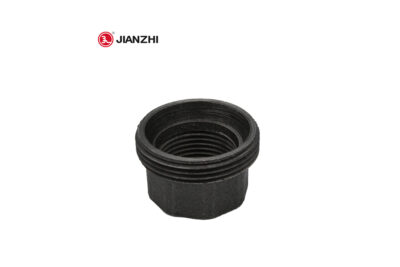Black gas pipe fittings are commonly used in residential gas supply systems for various applications.
The primary applications of black gas pipe fittings in residential gas supply systems include:
- Gas Piping: Black gas pipe fittings are used to connect and extend gas piping throughout the home. They are essential for routing natural gas from the gas meter to various appliances.
- Natural Gas Appliances: These fittings are employed to connect natural gas appliances, such as stoves, ovens, water heaters, furnaces, and fireplaces, to the gas supply lines. They ensure a safe and secure connection.
- Gas Furnaces: Black gas pipe fittings are used in the installation of gas furnaces, including gas lines and connections for both heating and ventilation systems.
- Water Heaters: They are used to connect gas-powered water heaters to the gas supply lines, ensuring a consistent and reliable fuel source for heating water.
- Gas Stoves and Ovens: Black gas pipe fittings are essential components for connecting gas stoves and ovens to the gas supply, allowing for precise control of cooking temperatures.
- Gas Fireplaces: In residential applications, black gas pipe fittings gas fireplaces provide warmth and ambiance. Black gas pipe fittings are used for the gas line connections to these fireplaces.
- Gas Dryers: Gas-powered clothes dryers are common in many homes. Black gas pipe fittings are used to connect these appliances to the gas supply line.
- Gas Grills: For outdoor cooking, gas grills often rely on natural gas as a fuel source. Black gas pipe fittings are used to connect the gas supply to the grill.
- Safety Shutoff Valves: Gas pipe fittings may include safety shutoff valves that allow residents to quickly shut off the gas supply in case of emergencies or when appliances need maintenance.
- Gas Pressure Regulators: These fittings can also include gas pressure regulators to ensure that the gas pressure supplied to residential appliances is within the specified range.
- Gas Meter Connections: At the point where the gas supply enters the residential property, black gas pipe fittings are used to connect the gas meter to the main gas line.
- Gas Leak Repairs: In cases of gas leaks or pipe damage, black gas pipe fittings can be used for repair and replacement, ensuring the gas system’s integrity.
It’s important to note that while black gas pipe fittings are used for various residential gas supply applications, safety is paramount. Proper installation, maintenance, and adherence to gas safety guidelines and regulations are essential to ensure the safe and reliable operation of gas systems in residential settings.
Can you explain the role of black gas pipe fittings in natural gas distribution systems for commercial and industrial properties?
Black gas pipe fittings play a crucial role in natural gas distribution systems for commercial and industrial properties. These fittings are essential components that facilitate the safe and efficient distribution of natural gas to power various equipment and processes.
Here’s an explanation of their role in such systems:
- Connection and Routing: Black gas pipe fittings are used to connect different segments of the natural gas distribution network, including pipes, valves, regulators, and appliances. They allow for the routing of natural gas from the main supply lines to the points of use within the commercial or industrial facility.
- Branching and Distribution: In complex industrial and commercial properties, natural gas distribution systems often require branching to supply gas to multiple areas or equipment. Black gas pipe fittings enable the creation of branch lines to serve various consumption points.
- Pressure Regulation: Gas pressure can vary within a distribution system, and different appliances or processes may require specific pressure levels. Black gas pipe fittings can include pressure regulators to ensure that the gas pressure delivered to various end-users is within the required range.
- Safety Shutoff and Control: These fittings often incorporate safety shutoff valves and control mechanisms that allow operators to control the flow of gas, shut off the supply in emergencies, and regulate gas distribution to individual components or zones.
- Appliance Connections: Black gas pipe fittings are used to connect natural gas-powered equipment and appliances in commercial and industrial settings. This includes boilers, heaters, ovens, industrial furnaces, turbines, and more.
- Customization and Adaptability: Commercial and industrial properties often have unique gas distribution requirements. Black gas pipe fittings allow for customization and adaptability to meet these specific needs, whether it involves creating complex distribution networks or accommodating various gas-powered devices.
- Support for Bulk Storage: In some cases, black gas pipe fittings are used to connect natural gas storage systems or bulk storage tanks to the distribution network. This is common in industrial facilities with significant gas consumption.
- Corrosion Resistance: Black gas pipe fittings are typically made of materials like black malleable iron or steel, which offer excellent corrosion resistance. This is particularly important in commercial and industrial settings where the equipment and fittings are exposed to harsh environments.
- Maintenance and Repairs: When maintenance or repairs are necessary, black gas pipe fittings play a role in the disassembly and reassembly of gas distribution systems. They allow for component replacement or repairs to be performed safely and efficiently.
- Code Compliance: The use of black gas pipe fittings in commercial and industrial properties must adhere to specific industry standards, codes, and regulations to ensure safety, compliance, and the proper operation of gas systems.
It’s important to emphasize that the installation, maintenance, and operation of natural gas distribution systems in commercial and industrial properties must be performed by qualified professionals who are knowledgeable about gas safety and are in compliance with relevant regulations. Proper design, installation, and regular inspection are essential to ensure the safety and reliability of these systems.
